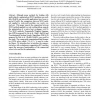Free Online Productivity Tools
i2Speak
i2Symbol
i2OCR
iTex2Img
iWeb2Print
iWeb2Shot
i2Type
iPdf2Split
iPdf2Merge
i2Bopomofo
i2Arabic
i2Style
i2Image
i2PDF
iLatex2Rtf
Sci2ools
111
click to vote
CEC
2003
IEEE
2003
IEEE
Comparative studies on micro heat exchanger optimisation
Although many methods for dealing with multi-objective optimisation (MOO) problems are available [Deb01] and successful applications have been reported [Coe01], the comparison between MOO methods applied to real-world problem was rarely carried out. This paper reports the comparison between MOO methods applied to a real-world problem, namely, the optimisation of a micro heat exchanger (¤ HEX). Two MOO methods, Dynamically Weighted Aggregation (DWA) proposed by Jin et al. [Jin01, Jin01b] and Non-dominated Sorting Genetic Algorithms (NSGA-II) proposed by Deb et al. [Deb00, Deb02], were used for the study. The commercial computational fluid dynamics (CFD) solver called CFD-ACE+1 is used to evaluate fitness. We introduce how to interface the commercial solver with evolutionary computation (EC) and also report the necessary functionalities of the commercial solver to be used for the optimisation.
| Added | 04 Jul 2010 |
| Updated | 04 Jul 2010 |
| Type | Conference |
| Year | 2003 |
| Where | CEC |
| Authors | Tatsuya Okabe, Kwasi Foli, Markus Olhofer, Yaochu Jin, Bernhard Sendhoff |
Comments (0)

